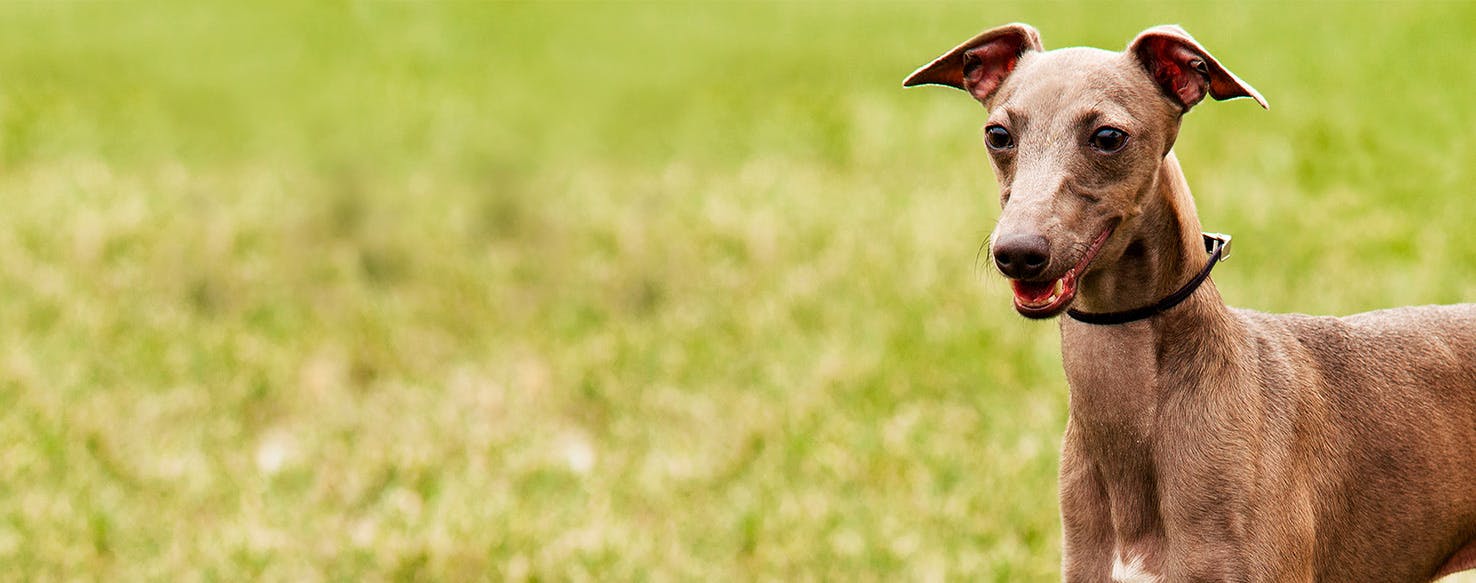- Home
- The Daily Wag!
- Behavior
- Why Do Greyhounds Puff Their Cheeks

Common
Irregular
Greyhounds prefer peace and quiet and are usually nonaggressive. Some people would even say they behave much like a cat around the house. We can all agree that Greyhounds are unique, not only because of their physical structure but also because they can behave in a way that is closely linked to their personality. Although all dog breeds can puff their cheeks at some point or another, it is important to realize why they do it and if there is any reason for concern. Let’s find out more about why Greyhounds puff their cheeks and what they are trying to communicate by reacting in this manner.
There are actually a few reasons that could explain why your Greyhound is puffing his cheeks. First of all, puffing refers to the action of exhaling rapidly, causing the cheeks to puff out. It’s also a term used to describe “huffing,” which means to growl or bark with a low noise and puff out or vibrate the cheeks. While some of the reasons may become a cause for concern, others may not be so serious. Context is very important here, so look for signs of huffing and puffing together with coughing, sneezing, panting heavily, looking lethargic, aggressive barking, or any other type of aggressive behavior. Puffing the cheeks is usually a form of stress relief and can also be a precursor to escalating aggressive reactions. It’s also a sign of nervousness. Pay attention to what happens to your Greyhound before and after puffing his cheeks.
Canine language must be taken in context, so if you notice any other symptoms accompanying the behavior, such as the ones we’ve just mentioned, this could indicate either stress or illness. Some dogs will puff out their cheeks and sneeze or cough to dislodge an object that is obstructing the airways or the nose. Sometimes, puffing the cheeks while breathing could indicate a lung disease, such as infections, tumors, or the presence of fluid. However, there’s no need to get too worried about it… take your dog to the vet as he or she will tell you exactly what’s wrong with your pup. In most cases, the puffing of the cheeks suggests certain levels of anxiety, arousal, or stress. Sometimes, the action may be directed toward kids or adults, as well as other animals. For the most part, Greyhounds will occasionally puff their cheeks at other dogs when they are getting ready to attack. Unfortunately, the same can be applied toward their human companions.
Need advice about your pet's health?
Get answers fast from a veterinary professional 24/7 in the Wag! App.
Get Vet ChatWhen coming across such situations, you’ll need to intervene promptly. If your Greyhound is puffing his cheeks in communication with other dogs or as a response to human behavior, remove your dog from the situation that is causing the problem. Keep him at a safe distance from the other animal and remove the person or your dog from the area immediately. When dealing with a medical issue, you’ll most likely see symptoms such as coughing or sneezing accompanying the behavior. Take your dog to the vet as soon as possible. Waiting for too long to do so can only aggravate the situation for both you and your pup.
Due to the fact that cheek puffing usually indicates a behavioral or stress issue, it’s best to deal with the problem using positive pet parenting. This involves learning about your dog’s personality traits and being able to identify the issues early on, to help prevent them from worsening over time and causing more harm. You should also consider teaching your children how to properly interact with the pup and not cause him to feel threatened, stressed, or unhappy about something or someone. Greyhounds are peaceful with other dogs and humans as well, so it’s best to avoid those situations that could trigger such unwanted behaviors.
Because this behavior is closely linked to your dog's level of stress, excitement, or anxiety, you should never ignore the signals he’s sending you. Pay closer attention to his reaction before the puffing starts and intervene when appropriate. Take the role of the leader and teach your pup to rely on you as his primary provider of safety. Having you as his stronghold will strongly diminish the need to constantly protect you or himself. Instead, it will reduce his anxiety and minimize or even prevent the stress from occurring. Lastly, don’t forget to keep the peace in your home… Greyhounds can be very sensitive to tension in the house, so make sure the atmosphere is as harmonious as it can be.
If there are no underlying medical conditions involved, the puffing of the cheeks will certainly point to a higher level of stress. If you notice your Greyhound blowing air out of his mouth, causing his cheeks to go in and out, make sure you get to the bottom of it and take proper action. Avoid those situations that stress your dog out and stay away from negative training methods as well.
Written by a Amstaff lover Marieta Murg
Veterinary reviewed by:
Published: 05/09/2018, edited: 01/30/2020
More articles by Marieta Murg

